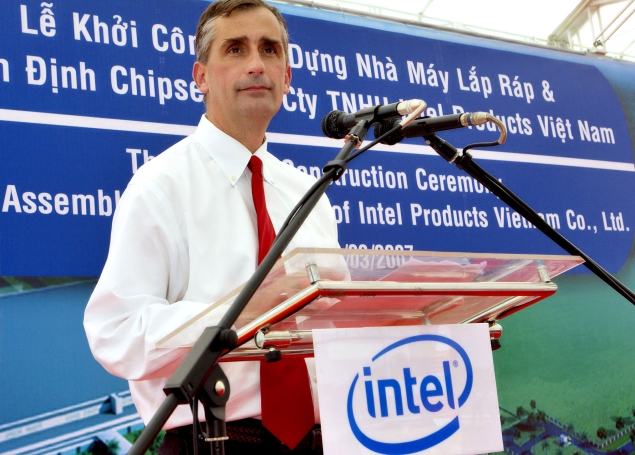- Home
- Laptops
- Laptops News
- New chief at Intel aims to expand chipmaking
New chief at Intel aims to expand chipmaking

The company that became a household name through its "Intel inside" stickers on personal computers is still the king of PC chips. But that is a shrinking business, and Intel is a laggard in making chips for hot products like smartphones and tablets.
That has put Intel in a bind, as semiconductor competitors long under the thumb of the Silicon Valley giant have gained traction through relationships with mobile device leaders like Apple and Samsung.
But Krzanich (pronounced KREZ-nick), 52, a company veteran who started with Intel as an engineer when he was 22, says he is cleareyed about the challenges and has a plan to stop his company's slide.
"I look at this world and see all kinds of devices connected to computers, and people connected to it all the time," Krzanich said in an interview. "We can bring things to companies that others haven't dreamed of."
He even has a broader picture of Intel's future, like imagining moving beyond today's popular mobile devices and into other gadgets in people's homes and even into so-called wearable computing devices. "If you're just talking phones, you're shooting behind the duck," he added.
Last year, almost two-thirds of Intel's $53 billion in revenue came from making chips for PCs, a market Krzanich acknowledges is "not growing, let's be honest."
Last month, researchers at the information technology firm IDC said PC demand declined more than 13 percent annually in the first quarter, as buyers turned to mobile devices like smartphones and tablets. In the same period, IDC said worldwide tablet shipments were up 142.4 percent, while smartphone shipments were up 41.6 percent.
The bulk of Intel's remaining revenue came from chips for computer servers, a business Intel still dominates.
Krzanich, who is the company's chief operating officer and is an expert in running big chip factories, will become Intel's sixth chief executive on May 16, succeeding Paul S. Ottellni, who unexpectedly announced his retirement last November. Intel also promoted Renee James, the 48-year-old chief of the company's software division, to president on Thursday.
Some analysts saw the appointment of Krzanich as a signal that the company would increase investment in its manufacturing while chasing new customers with chips meant for mobile products.
"The PC and server markets are so big, so important, that you can't take your eye off the ball," said Doug Freedman, an analyst with RBC Capital Markets. Krzanich, he noted, "is very much about the results. He comes from a world of schedules and manufacturing."
But Freedman also said, "There's a part of the investment community that would have preferred an outsider" to shake up the company. This was never likely at Intel, he noted, where employment shorter than a decade marks one as a newcomer.
Intel said it considered both inside and outside candidates.
Krzanich was one of several internal candidates who made their final pitches to Intel's board last weekend. James was also vying for the job, and Krzanich said the two had privately discussed working together, no matter who became chief executive.
"She was a very viable candidate," he said. "Our vision of a mobile, connected computing environment was so close, we saw together we could drive things faster."
Though he would not detail his entire strategy in the interview, Krzanich said he saw no reason to reduce Intel's spending on cutting-edge chip technology and manufacturing.
"I fought for this job for a reason," he said. "The assets that made us great in PCs and servers are even stronger in the mobile and cloud world."
In part, Krzanich says he believes he is carrying through on a plan that's already underway.
On Monday, for example, Intel will introduce a new version of its low-power Atom chip designed for communications products, where its market is negligible.
If successful, Krzanich will create an Intel markedly different from the past.
Under Andrew S. Grove, the executive who coined the unofficial company slogan, "Only the paranoid survive" and led Intel to dominance in providing chips for PCs and servers, the company honed a business known for a few close relationships with partners like Microsoft, and then PC manufacturers like Hewlett-Packard and Dell. Those relationships and the fortunes of those companies have declined in recent years.
Today, Intel faces competition from Qualcomm and Nvidia in the manufacturing of chips for mobile devices. HP is showing off servers that use parts from five or more competitors.
Even Microsoft, once the other half of a relationship so close that pundits called the two companies Wintel, is working with other chipmakers for its video game consoles and tablets.
© 2013, The New York Times News Service
Catch the latest from the Consumer Electronics Show on Gadgets 360, at our CES 2026 hub.
Related Stories
- Samsung Galaxy Unpacked 2025
- ChatGPT
- Redmi Note 14 Pro+
- iPhone 16
- Apple Vision Pro
- Oneplus 12
- OnePlus Nord CE 3 Lite 5G
- iPhone 13
- Xiaomi 14 Pro
- Oppo Find N3
- Tecno Spark Go (2023)
- Realme V30
- Best Phones Under 25000
- Samsung Galaxy S24 Series
- Cryptocurrency
- iQoo 12
- Samsung Galaxy S24 Ultra
- Giottus
- Samsung Galaxy Z Flip 5
- Apple 'Scary Fast'
- Housefull 5
- GoPro Hero 12 Black Review
- Invincible Season 2
- JioGlass
- HD Ready TV
- Laptop Under 50000
- Smartwatch Under 10000
- Latest Mobile Phones
- Compare Phones
- Tecno Spark Go 3
- iQOO Z11 Turbo
- OPPO A6c
- Samsung Galaxy A07 5G
- Vivo Y500i
- OnePlus Turbo 6V
- OnePlus Turbo 6
- Itel Zeno 20 Max
- Lenovo Yoga Slim 7x (2025)
- Lenovo Yoga Slim 7a
- Lenovo Idea Tab Plus
- Realme Pad 3
- Garmin Quatix 8 Pro
- NoiseFit Pro 6R
- Haier H5E Series
- Acerpure Nitro Z Series 100-inch QLED TV
- Asus ROG Ally
- Nintendo Switch Lite
- Haier 1.6 Ton 5 Star Inverter Split AC (HSU19G-MZAID5BN-INV)
- Haier 1.6 Ton 5 Star Inverter Split AC (HSU19G-MZAIM5BN-INV)

















